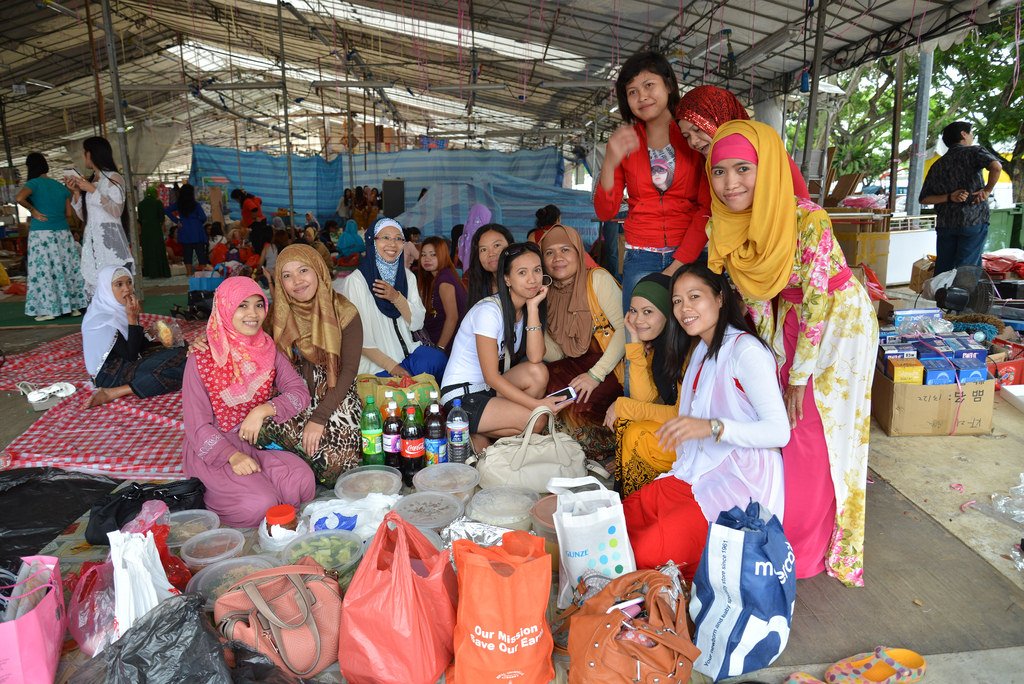HelperChoice was invited to speak last Saturday April 21, 2017 to the first edition of the Pediatrics & Parenting Conference organized by AD MediLink at the JW Marriott Hotel in Hong Kong. Laurence Fauchon, Founder of HelperChoice, joined a panel on Navigating the tricky Parent-Child-Helper triangle, where Dr. Melaine Bryan and Ms. Catherine Banson were two other speakers at the same panel, while Ms. Kat Lau from Sassy Mama was the moderator.
Laurence Fauchon was asked three questions from the moderator, before the Q&A from the audience.
Ms. Kat Lau: From an agency perspective, do you have any tips on hiring a helper that will best suit a family’s culture and parenting style?
HelperChoice: Hiring a helper to care for vulnerable people like children is a big commitment for parents. We are talking about a stranger who will live 24/7 in their apartment, and will care for what matters most to them. Having said that, the first thing parents should do is to figure out exactly what their parenting style is and what they expect from their helper. Do they want their 1-year old to feed herself to increase her autonomy? Or do they prefer to feed their 1-year old because they don’t like to clean the mess after lunch? Very often, parents do things on the spot, without deeply thinking about what they are doing. They behave this or that way because that’s what they were taught when they were little. If they are not themselves clear on parenting rules and guidelines, then how can they hire someone to behave in the same way?
Once this part has been made clear, I would advise to interview at least 10 to 20 candidates, with different background and experience. It is probably too ambitious to think you will interview someone who thinks and behaves the same way you do. However, you should focus on finding a person who agrees with your point of view, is ready to learn from you and adjust her way of doing things with your children to move closer to yours.
Finally, I think it’s important to note that hiring a helper is just the beginning of the relationship. It may feel like an accomplishment, but you are hiring a helper on a 2-year contract. Your helper will need refresher courses all the way through her employment with you.
Ms. Kat Lau: What can you tell us about the helper’s perspective when she chooses to work for a family (or decides to leave)? How much does the parenting style and child-rearing habits influence her choice?
HelperChoice: There are two key aspects for a helper when looking for a child-care job in Hong Kong and during employment: mutual respect and mutual trust.
Children will mirror what they see from their parents. Treating helpers disrespectfully in front of children will just make them feel they can behave in the same way. This leads to the helper not having the necessary authority to make children obey her, which can be very serious in some cases. Let’s consider a very common situation where the helper needs to cross the street with the child she cares for. If the child doesn’t accept to hold the hand of the helper, an accident can very quickly happen. Everyone knows how roads can be dangerous in a city like Hong Kong.
Trust is also very important. Of course, it may not be easy to trust a stranger with your own children, most of us probably don’t even 100% trust relatives for that! But the reality is that it is a necessity to trust the adult who lives with you and cares for your children while you are at work. I had this story from a helper who used to care for a 2-year old little girl. She would take her to the playground every day, and there was that day when the little girl didn’t want to follow what the helper was saying. She was overexcited, and at some point, she fell and hurt herself. She was bleeding a bit, nothing very serious either, but when the parents came home, they got very upset against the helper and didn’t trust that she had been supervising the little girl well enough. The helper was so sad to suddenly realise that she wasn’t trusted, that she decided to break her contract. I’m not here to judge whether parents or helper were right, but more to say that parenting style and child-rearing habits do influence helpers when making decisions about their job.
Ms. Kat Lau: What can you share about helpers, from where they come from to their cultural and socio-economic background, that can help parents better understand and manage the relationship?
HelperChoice: I often hear parents in Hong Kong complain about the lack of common sense of their domestic worker. Although common sense may seem to be universal, it is a cultural concept. Let’s take a basic example: I’m asking for a glass of water. If I’m Asian, I will expect a cup of hot water. If I’m Western, I will expect a glass of cold water. Obviously, in any case, I’ll think it’s common sense that the person brings me water at the temperature I expect, but as you understand it is not.
Domestic helpers in Hong Kong come from developing South-East Asian countries. Their houses are not made of concrete, they never saw a refrigerator or a washing machine in their country of origin. Then they come to Hong Kong, arrive to a megalopolis with MTR and high-rise buildings. They may be asked to clean windows; their first reflex will be to lean out of the window to make sure they clean it perfectly. Do they think of the risk of falling out of the window? Certainly not! It’s the first time ever they live in a high-rise building, 15 to 50 floors above the floor. Their own houses do not even have glass windows, their windows are made of bamboos, so it’s probably also the first time they clean glass windows.
All of this to say that parents should not expect domestic helpers to have the same cultural references when it comes not only to do general household chores but also when they care for their children. In the Philippines, children are not raised only by the mother and the father; they are raised by the extended family, which includes grand-parents, aunts, uncles, cousins. There are many cultural differences in caring for children, and parents should have the intelligence to teach their domestic helper how they want things to be done and the patience to give refresher statements whenever needed.
The Q&A session from the audience was very enlightening, and we would like to share here two questions asked by parents.
Q1: A lady whose helper had helped care for their daughter since she was born 5 years ago, was very worried of their upcoming departure from Hong Kong, and wondered what would be the best way to manage the separation between her daughter and the helper, who were both very attached to each other.
HelperChoice: Children do get very attached to their nanny. They spend more time with young children in Hong Kong than working parents can do. They sing, they play, they teach them many things. So yes, the day when they will be separated will be tough. However, as you are returning to your home country, your children will have a lot of opportunities to bond with their relatives, whom they probably barely know. They may build new relationships with their grand-parents, which will help them go through this difficult period.
Q2: A young couple expecting their first baby asked for tips on hiring the person who would care for their baby.
HelperChoice: The first thing you must do is talk with your partner and figure out what you exactly expect from your helper. Situations can be very different between families, depending on whether you will both be full-time working parents for example. I would then advise to meet as many helpers as you can. This is your first time hiring a helper, so you may not be very seasoned in hiring, and it can be good for you to speak to different people, until you have a click. The helper may not need to have children of her own, but you may want to look for someone who has had previous experience taking care of a new-born baby.
Finally, do make sure to ask for references: training certificates if the helper claims she has attended new-born related training classes for example, contact numbers from previous employers so you can have a quick chat with them.





